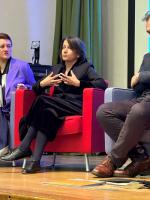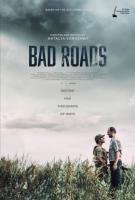At the very end of Trinity term 2024, the Taylorian hosted an evening with Natalka Vorozhbyt, one of Ukraine’s most prominent playwrights. Co-organised by the Faculty of Medieval and Modern Languages, the Faculty of English, and St Hugh’s College, the event was long-awaited: Vorozhbyt’s work is well-known in Ukraine and abroad, with her plays being performed at such theatres as the Royal Court, and her films earning domestic and international recognition. The evening, which featured a live performance, a film screening, and a panel discussion, introduced Vorozhbyt’s work to the audience and presented an opportunity to discuss it with the author herself in the context of the ongoing war in Ukraine.

The evening started with a performance of an excerpt from the 2014 play Take the Rubbish Out, Sasha. The play’s protagonist, Sasha (played by MML’s own DPhil Jake Robertson), has just suffered a fatal heart attack and returns to his wife and stepdaughter, Katia and Oksana, as a ghostly presence as the women make arrangements for his wake. Sasha, a Ukrainian Army colonel, is eager to come back from the dead and join Ukraine’s war effort as the military conflict takes over the country’s east. Despite his family’s disapproval, Sasha is adamant about following a ‘sixth call for mobilisation’ which recruits the dead as the previous five waves have already taken all the living. The mix of realism and mysticism, humour and the grim reality of war permeates the piece, and the convincing performance on the Taylorian stage reminded the audience of the ongoing Ukrainian crisis, which started over 10 years ago as a ‘local’ war in the country’s southeast and has grown into Russia’s full-scale invasion of Ukraine since February 24, 2022.
Along with her theatre career, Natalka Vorozhbyt has also made a remarkable contribution to Ukraine’s national cinema as a screenwriter and director. To name a few films, she wrote the screenplay for Cyborgs: Heroes Never Die (2017), Ukraine's highest-grossing blockbuster at the time about the defenders of the Donetsk Airport in the early months of the war. Bad Roads (2020), Vorozbhyt’s directorial debut which explores the war and a spiral of violence it inevitably creates, premiered at the Venice Film Festival and was Ukraine’s entry for the Academy Award. At the Taylor Institution, Vorozhbyt shared her latest work titled Are You OK?, a 5-minute film shot in the months following the full-scale invasion. This brief yet powerful story allowed us a glimpse of the life of a family whom the war forced to flee Ukraine. The film reminded us that war is not bound by geography: even escaping immediate danger does not allow one to escape war altogether as the memory of trauma haunts their seemingly peaceful everyday life.

The panel discussion and the Q&A that followed brought the two audiovisual experiences together. Natalka and her discussants Prof. Julie Curtis, Jack Clover, and Alice Oswald talked about the evolution of Ukrainian theatre, cinema, and culture in general and the effect the war has had on it in the past ten years. Despite countless disruptions imposed by the war, the country has seen a rediscovery of national culture by purging itself from its Russia-centrism, a Soviet legacy that followed Ukrainian culture until 2014. Vorozhbyt noted that Ukraine has been enjoying a vibrant cultural scene even after the beginning of the full-scale invasion. The artist also discussed her own creative process and positionality: the stories she tells in her works, while indicative (and prophetic indeed) of the broader political, military, and cultural contexts, are inseparable from her personal experience. ‘Since 2022, I have turned from a researcher of war into a subject of research’ revealed Vorozhbyt. This could well be the verdict for many Ukrainian artists whose strength, empathy, and personal investment allow them to support people at home and educate international audiences about Ukraine.
Natalka Vorozhbyt’s unique vision allows anyone to appreciate her work regardless of their familiarity with and proximity to Ukrainian culture. The personal and the national are intertwined with the universal as she dissects gender roles, interpersonal relationships, and human psychology. Whether for some attendees that evening was the first time they heard about Natalka Vorozhbyt or they had already seen her work in theatres and cinemas, for all of us, the event was a timely reminder of Ukraine’s resilience and creative power amidst Russia’s ongoing armed aggression. As Natalka continues to work on plays and films and begins new social projects, there is hope that the Faculty of Medieval and Modern Languages will host more events that give the spotlight to Ukrainian artists in the future.